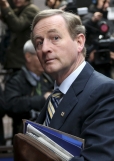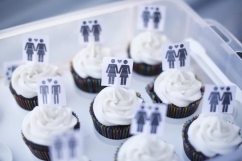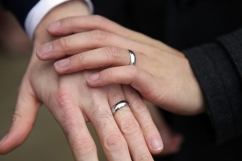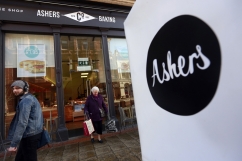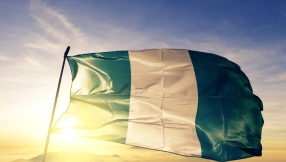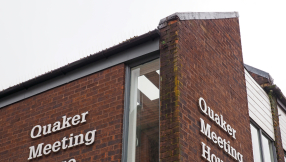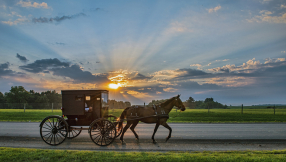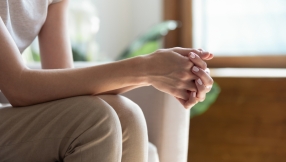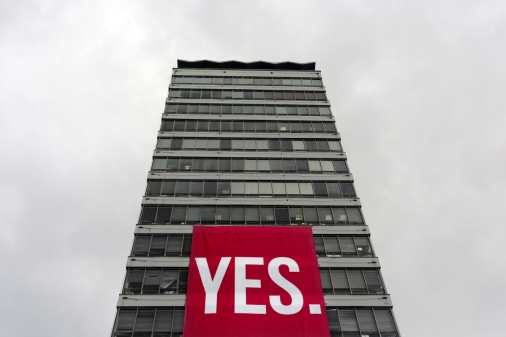
Momentum is building ahead of Ireland's historic same-sex marriage referendum that will take place on Friday, and the Catholic Church has firmly positioned itself in opposition to the motion.
A significant proportion of clergy has urged for a 'no' vote. Archbishop Eamon Martin, Primate of All Ireland, said last week that there are "no grounds for considering homosexual unions to be in any way similar or even remotely analogous to God's plan for marriage and family". Speaking for the Bishops of Ireland, he said they are clear that they "cannot support this amendment" and urged the Irish population to reflect and pray very carefully before voting.
However, this view doesn't represent all Catholics, or even clergy, across the country. Tony Flannery, a Redemptorist missioner who co-founded the Association of Catholic Priests (ACP), will be voting in favour. He was suspended by the Vatican in 2012 after refusing to sign a statement affirming the Church's traditional teaching on matters including homosexuality, contraception and the ordination of women, telling the New York Times that the document would go against "everything I believe in".
"If I signed this, it would be a betrayal not only of myself but of my fellow priests and lay Catholics who want change," he told the newspaper. "I refuse to be terrified into submission."
Despite the complexities, the referendum has been framed as a Church versus State issue, but speaking to Christian Today ahead of Friday's vote, Flannery said at least ten priests have joined him in publicly stating their support for gay marriage. Polls suggest that the overwhelming majority of Irish people will vote yes on May 22.
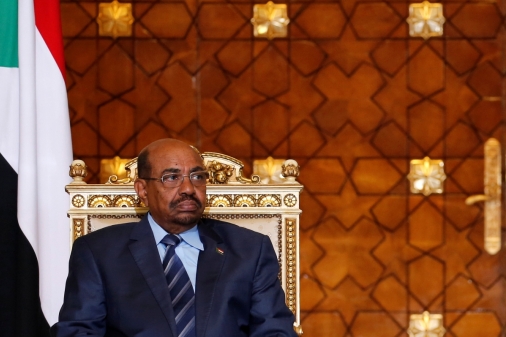
These polls are not entirely reliable, of course, but the distance between the official Church line and the mood of the Irish population is substantial. Flannery's view is that the Church risks alienating young people in particular, who have been mobilised to vote in this referendum in a way that Ireland has never seen before.
"If the referendum is defeated, there will be enormous anger and bitterness among the under 35s," he said. "The Church will be seen as the body that defeated it – old, male, celibate men dictating how people should live their lives...We as a Church have already by and large lost the young generation, they've drifted away, and [if the result of Friday's vote is a no] it is going to be a massive blow."
Flannery said he is concerned that the "Church would be seen as a major enemy if it brings about a defeat. So strategically and tactically I think the bishops are making a big mistake."
He praised the Archbishop of Dublin, Diarmuid Martin, for being "much more nuanced in his position". Martin wrote in the Irish Times on Tuesday that he has "strong views on marriage" being a traditional structure between a man and a woman, and will be voting no on Friday, but has "no wish to stuff...[his] religious views down other people's throats." He expressed a wish to imitate the position of Pope Francis, who has consistently rejected same-sex marriage, but has urged Catholics not to make judgements on other people.
"I have never told people how to vote," Martin added. "I encourage everyone to vote and to reflect carefully. Reasoned argument on marriage and the family is vital for our society."
Flannery also highlighted the Bishop of Derry, Donal McKeown, who "seems to be a good bit more nuanced in the sense that he has an awareness of the possibility that some Catholics might in conscience decide to vote yes, and that's okay too. And he's also aware that a no vote could be seen as a very strong put down of gay people who have already been put down many times in this country both by the State and the Church."
It is this that seems to be Flannery's main gripe with the Church's position, which he says is far removed from Pope Francis' attempt to create an open and welcome Church. The reason I've come to this decision [pro-gay marriage] is I think that gay people have been treated dreadfully," Flannery said.
"I'm not gay myself, but I have a good few friends that are, and as a priest I've talked to many gay people...It's only 20 years since homosexual relations were decriminalised in this country. For the first 35 years of my life the State was telling them it was criminal if they wanted to express their love, and then cooked with that the Church was telling them that they were intrinsically disordered – I think that if we vote no in this referendum, it will be another kick in the teeth to gay people, and would be very much out of tune with the whole type of Church that Pope Francis is trying to create.
"I would be leaning towards the people on the fringes, the people who have been discriminated against – for their sake I will be voting yes."
Arguments about changing the meaning of marriage, adoption and surrogacy "make no sense to me," Flannery added. "The meaning of marriage has changed even in my lifetime...the whole place of a woman in marriage is so different now to what it was 30 years ago. Those arguments just don't make sense, so I will vote yes because I think gay people deserve that support at this stage in our society and in the Church."
In a recent article for Ireland's Sunday Independent, Flannery said the referendum was a good opportunity for Catholics to "clarify for ourselves what exactly we believe and where we stand."
"Pope Francis has brought us back to some of the very basic teachings of Jesus. He constantly tells us that love, compassion and mercy are fundamental Christian attitudes. If this country rejects the proposal put before us in this referendum, I fear that gay people will hear it as a further rejection, another example of society telling them they are lesser human beings," he wrote.
"For me, the really Christian thing is to give them a strong and clear message that they are loved and accepted just as they are, and that they deserve to be treated with the same dignity as the rest of us."
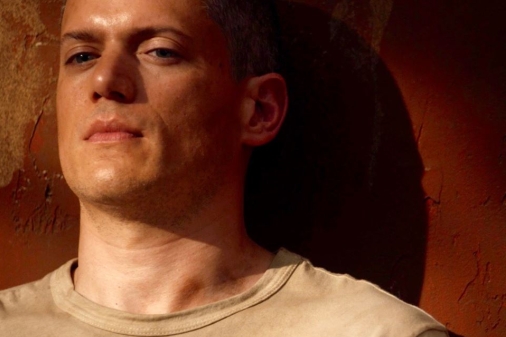
Flannery is not alone in his stance. Father Iggy O'Donovan of St Augustine's Church in Limerick wrote an op-ed in the Irish Times in March advocating for a yes vote and underlining the "difference between civil and religious law".
"When we become legislators, though, as we do when we vote in referendums, we legislate for ALL our fellow citizens. We do not vote as members of this or that church or faith," he said.
"Of course we cannot leave our religiously based moral convictions outside the polling station, but we do need to remember the difference between civil and religious law."
O'Donovan said it is not necessary for the State to impose the convictions of one group on another, however passionately they are held, and "respect for freedom of others to hold religious or moral views which we ourselves find we cannot share is a sign of strength, not weakness."
Father Pádraig Standún, a parish priest in western Ireland, also stated his support for a yes vote in a column for the Connaught Telegraph. "I am one of those clergy-persons who intends to vote yes, not to cock a snoot at the leadership of my church, or to jump on a popular bandwagon, but because I think it is the right thing to do," he wrote.
"As a follower of Jesus, the a la carte Jew who recognised when certain laws had run their courses, I am convinced that now is the right time to have marriage equality."
Standún said that he expected more Catholic lay people to vote for the legislation than against: "The people of God have moved on. Leaders please follow," he wrote. "We in the Roman Catholic Church have made so many mistakes in the past half century or so that we need to stand back and question our motives in taking certain stances, in fighting unnecessary battles with outdated catchphrases.
"It is time to be positive, to welcome gay, lesbian and transgender to the top table."
Flannery said there was "no question" as to whether the referendum is affecting how people perceive Catholicism in Ireland, but Father Seamus Ahearne, also of the ACP, said that the issue won't be divisive for the Church. "We did a canvass of our membership, trying to evoke opinions, and found that they were very thoughtfully divided," he told Christian Today. "Some are very strongly for a yes, and some very strongly for a no, and both are very valid."
Ahearne, who will be voting against the legislation on Friday, thinks the system of either a simple yes or no vote is flawed. "It's very crude," he said. "It doesn't represent the people. It's a clean way to finish and get a tidy result, but it's not representative of the people. [The issue is] much more complex than that." He said most people want full rights for civil partnerships, but are wary of using the language of marriage.
He also said the Church has treated gay people "very disgracefully" in the past, and compassion and humility are vital, but that doesn't automatically mean it should advocate for same-sex marriage and that voting no is not a sign of homophobia.
"The role of the Church is to enter into discussion," he added. "This is not a Church-State battle; it's not even a religious question. It's about our understanding of the law, our understanding of what the constitution means, and what should be enshrined within in. We can't follow the fashion or the fads of the moment – we have to go slowly."






